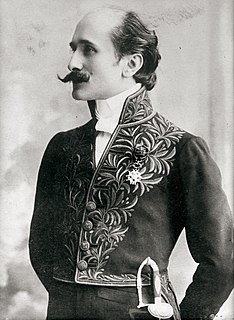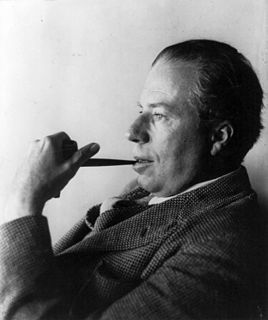Top 1200 Wit Quotes & Sayings - Page 20
Explore popular Wit quotes.
Last updated on April 19, 2025.
A damnably readable, streamlined, yet deeply researched work. Skipping the ancestors and aftermath of conventional biography, Max gives us the man, his work, and his times-the niceties of which (so complicated, so exquisitely intertwined) Max articulates with, well, Wallace-like lucidity and wit. Above all this is the story of a touching young man who insisted on being something better than simply the smartest person in the room.
For eighteen centuries every engine of destruction that human science, philosophy, wit, reasoning or brutality could bring to bear against a book has been brought to bear against that book to stamp it out of the world, but it has a mightier hold on the world today than ever before. If that were man's book it would have been annihilated and forgotten hundreds of years ago.
In times like ours, where the growing complexity of life leaves us barely the time to read the newspapers, where the map of Europehas endured profound rearrangements and is perhaps on the brink of enduring yet others, where so many threatening and new problems appear everywhere, you will admit it may be demanded of a writer that he be more than a fine wit who makes us forget in idle and byzantine discussions on the merits of pure form.
Zeus Is Dead is full of laugh-out-loud moments, lashings of sly wit, moan-worthy puns, and a complex, fast-paced storyline. There aren't very many humorous fantasy murder mysteries out there, especially not as intricately constructed as this one. Michael G. Munz takes a 'What if,' and runs with it like a toddler with Mom's smart phone. The guffaw-worthy throwaway bits will remind you of Douglas Adams. A very enjoyable read.
A woman well bred and well taught, furnished with the additional accomplishments of knowledge and behaviour, is a creature without comparison. Her society is the emblem of sublimer enjoyments, her person is angelic, and her conversation heavenly. She is all softness and sweetness, peace, love, wit, and delight. She is every way suitable to the sublimest wish, and the man that has such a one to his portion, has nothing to do but to rejoice in her, and be thankful.
It is a curious fact, but a fact it is, that your witty people are the most hard-hearted in the world. The truth is, fancy destroys feeling. The quick eye to the ridiculous turns every thing to the absurd side; and the neat sentence, the lively allusion, and the odd simile, invest what they touch with something of their own buoyant nature. Humor is of the heart, and has its tears; but wit is of the head, and has only smiles - and the majority of those are bitter.
I like to consider myself a student of hip hop. There's a certain level of certification and wit and craftsmanship that comes with rapping. As rap progresses - it's a young genre - it's becoming way more mainstream, crossing over to different lanes. I feel like it's losing its essence in a way, because it's getting commercialised. I want to keep it fresh and keep it progressive, but I also want to respect the foundation of what rap is about.
The silliness-much of which is clearly intentional-is blended with some genuine grandeur. The Pixar touch is evident in the precision of the visual detail and in the wit and energy of Michael Giacchino's score, but the quality control that has been exercised over this project also has a curiously undermining effect. The movie eagerly sells itself as semitrashy, almost-campy fun, but it is so lavish and fussy that you can't help thinking that it wants to be taken seriously, and therefore you laugh at, rather than with, its mock sublimity.
A fine and beautiful life lies before thee, because thou hast a lively mind and a good wit. Thine arms are very strong and sturdy. Swimming hath helped to make them so, but only because thou hast had the will to do it. Fret not, my son. None of us is perfect. It is better to have crooked legs than a crooked spirit. We can only do the best we can with what we have. That, after all, is the measure of success: what we do with what we have.
In our Mechanics' Fair, there must be not only bridges, ploughs, carpenter's planes, and baking troughs, but also some few finer instruments,--rain-gauges, thermometers, and telescopes; and in society, besides farmers, sailors, and weavers, there must be a few persons of purer fire kept specially as gauges and meters of character; persons of a fine, detecting instinct, who note the smallest accumulations of wit and feeling in the bystander.
The drama is not a mere copy of nature, not a facsimile. It is the free running hand of genius, under the impression of its liveliest wit or most passionate impulses, a thousand times adorning or feeling all as it goes; and you must read it, as the healthy instinct of audiences almost always does, if the critics will let them alone, with a grain of allowance, and a tendency to go away with as much of it for use as is necessary, and the rest for the luxury of laughter, pity, or poetical admiration.
Calculating people are contemptable. The reason for this is that calculation deals with loss and gain, and the loss and gain mind never stops. Death is considered loss and life is considered gain. Thus, death is something that such a person does not care for, and he is contemptable. Furthermore, scholars and their like are men who with wit and speech hide their own true cowardice and greed. People often misjudge this.
A heartwarming tale of Christmas past that's chock full of all the wit and hilarity we admire in America's favorite humorist--Mark Twain. Carlo DeVito brings us back one hundred years to a magical time in Twain's family life, revealing a house that's brimming with love and laughter, as well as the profound heartbreaks of life. A Mark Twain Christmas only deepens our understanding and respect for both the man and his work.
It hardly needs explaining at length, I think, how much authority or beauty is added to style by the timely use of proverbs. In the first place who does not see what dignity they confer on style by their antiquity alone?... And so to interweave adages deftly and appropriately is to make the language as a whole glitter with sparkles from Antiquity, please us with the colours of the art of rhetoric, gleam with jewel-like words of wisdom, and charm us with titbits of wit and humour.
Statesmen and legislators, standing so completely within the institution, never distinctly and nakedly behold it. They speak of moving society, but they have no resting-place without it. They may be men of a certain experience and discrimination, and have no doubt invented ingenious and even useful systems, for which we sincerely thank them; but all their wit and usefulness lie within certain not very wide limits. They are wont to forget that the world is not governed by policy and expediency.
But the greatest error of all the rest is the mistaking or misplacing of the last or farthest end of knowledge: for men have entered into a desire of learning and knowledge, sometimes upon a natural curiosity and inquisitive appetite; sometimes to entertain their minds with variety and delight; sometimes for ornament and reputation; and sometimes to enable them to victory of wit and contradiction; and most times for lucre and profession; and seldom sincerely to give a true account of their gift of reason, to the benefit and use of men.
[D]emocracy will soon degenerate into an anarchy, such an anarchy that every man will do what is right in his own eyes and no man's life or property or reputation or liberty will be secure, and every one of these will soon mould itself into a system of subordination of all the moral virtues and intellectual abilities, all the powers of wealth, beauty, wit and science, to the wanton pleasures, the capricious will, and the execrable cruelty of one or a very few.
Ko Un's poems evoke the open creativity and fluidity of nature, and funny turns and twists of Mind. Mind is sometimes registered in Buddhist terms - Buddhist practice being part of Ko Un's background. Ko Un writes spare, short-line lyrics direct to the point, but often intricate in both wit and meaning. Ko Un has now traveled worldwide and is not only a major spokesman for all Korean culture, but a voice for Planet Earth Watershed as well.
Born Losers is a beautiful piece of writing. Scott Sandage is history's Dickens; his bleak house, the late nineteenth century world of almost anonymous American men who failed. With wit and sympathy, Sandage illuminates the grey world of credit evaluation, a little studied smothering arm of capitalism. This is history as it should be, a work of art exploring the social cost of our past.
Surely in much talk there cannot choose but be much vanity. Loquacity is the fistula of the mind,--ever-running and almost incurable, let every man, therefore, be a Phocion or Pythagorean, to speak briefly to the point or not at all; let him labor like them of Crete, to show more wit in his discourse than words, and not to pour out of his mouth a flood of the one, when he can hardly wring out of his brains a drop of the other.
For such is the nature of men, that howsoever they may acknowledge many others to be more witty, or more eloquent, or more learned, yet they will hardly believe there be many so wise as themselves, for they see their own wit at hand, and other men's at a distance. But this proveth rather that men are in that point equal, than unequal. For there is not ordinarily a greater sign of the equal distribution of any thing than that every man is contented with his share.
All sentiment is right; because sentiment has a reference to nothing beyond itself, and is always real, wherever a man is conscious of it. But all determinations of the understanding are not right; because they have a reference to something beyond themselves, to wit, real matter of fact; and are not always conformable to that standard.
Hope's Folly is a rapid-fire romp through futuristic political intrigue and high-risk passion The tug of war between decorum and passion keeps the romantic intrigue smoldering. With Hope's Folly, Linnea Sinclair builds on a secure reputation as a leading fashioner of science fiction romance. She straddles and blends these genres with a unique bravura and wit.
When I look at American history and I look at what history means to me, I look at it as if it were a string of stories. And if it's told well enough and in a way that's charming and warm and with wit and humor, then it takes a bit of the edge off of it. You can still tell the truth, but if you tell it very sweetly and very warmly, it makes it go down a bit easier.
When we look to presumed sources of origin for competing evolutionary explanations of the giraffe's long neck, we find either nothing at all, or only the shortest of speculative conjectures. Length, of course, need not correspond with importance. Garrulous old Polonius , in a rare moment of clarity, reminded us that "brevity is the soul of wit" (and then immediately vitiated his wise observation with a flood of woolly words about Hamlet 's Madness.
Over his illustrious career, John Harris has explored the most challenging bioethical questions with insight, engaging wit, and eloquence. In Enhancing Evolution, Harris does it again. He argues that it is not just an option but an obligation for people to use available biomedical technologies to enhance their own--and their children's--physical and mental abilities. Harris rightly deserves his reputation for fearlessly following his ethical arguments wherever they lead.
I am terribly glad to be alive; and when I have wit enough to think about it, terribly proud to be a man and an American, with all the rights and privileges that those words connote; and most of all I am humble before the responsibilities that are also mine. For no right comes without a responsibility, and being born luckier than most of the world's millions, I am also born more obligated.
Disease generally begins that equality which death completes; the distinctions which set one man so much above another are very little perceived in the gloom of a sick chamber, where it will be vain to expect entertainment from the gay, or instruction from the wise; where all human glory is obliterated, the wit is clouded, the reasoner perplexed, and the hero subdued; where the highest and brightest of mortal beings finds nothing left him but the consciousness of innocence.
The Divine was beyond description, beyond knowing, beyond comprehension. To say that the Divine was Creation divided by Destruction was as close as one could come to definition. But the puny of soul, the dull of wit, weren't content with that. They wanted to hang a face on the Divine. They went so far as to attribute petty human emotions - anger, jealousy, etc - to it, not stopping to realize that if God were a being, even a supreme being, our prayers would have bored him to death long ago.
Behold great Whitman, whose licentious line Delights the rake, and warms the souls of swine; Whose fever'd fancy shuns the measur'd pace, And copies Ovid's filth without his grace. In his rough brain a genius might have grown, Had he not sought to play the brute alone; But void of shame, he let his wit run wild, And liv'd and wrote as Adam's bestial child.
Eric Schlosser's book on the economy and strategies of the fast-food business should be read by anyone who likes to take their children to fast-food restaurants. I shall certainly never do that again. He employs a long, cold burn, a quiet and impassioned accumulation of detail, with calm, wit and clarity. (...) Fast Food Nation is witness to the rigour and seriousness of the best American journalism, readable, reliable and extremely carefully done.
These fellow-mortals, every one, must be accepted as they are: you can neither straighten their noses, nor brighten their wit, nor rectify their dispositions; and it is these people-amongst whom your life is passed-that it is needful you should tolerate, pity, and love: it is these more or less ugly, stupid, inconsistent people whose movements of goodness you should be able to admire-for whom you should cherish all possible hopes, all possible patience.
The novella is at once the most elegant and demanding form: a writer must balance the looseness of a novel with the concision of a short story, a feat that only the bravest and most talented of us can manage. In Brazil, Jesse Lee Kercheval proves, yet again, that she is exactly the right writer for the job. A wild American picaresque, Brazil snaps along briskly, yet feels full-fleshed, and brims with a sly wit and grace.
The soul grows into lovely habits as easily as into ugly ones, and the moment a life begins to blossom into beautiful words and deeds, that moment a new standard of conduct is established, and your eager neighbors look to you for a continuous manifestation of the good cheer, the sympathy, the ready wit, the comradeship, or the inspiration, you once showed yourself capable of. Bear figs for a season or two, and the world outside the orchard is very unwilling you should bear thistles.
Françoise could not help taking a surreptitious glance at Xavière: she gave a start of amazement. Xavière was no longer watching, her head was lowered. Françoise barely suppressed a scream. The girl was pressing the lighted end against her skin, a bitter smile curling her lips. It was an intimate, solitary smile, like that of a half-wit; the voluptuous, tortured smile of a woman possessed of some secret pleasure.
Truth is disputable; not taste: what exists in the nature of things is the standard of our judgement; what each man feels within himself is the standard of sentiment. Propositions in geometry may be proved, systems in physics may be controverted; but the harmony of verse, the tenderness of passion, the brilliancy of wit, must give immediate pleasure. No man reasons concerning another's beauty; but frequently concerning the justice or injustice of his actions.
And new philosophy calls all in doubt, The element of fire is quite put out; The sun is lost, and the earth, and no man's wit Can well direct him where to look for it. And freely men confess that this world's spent, When in the planets, and the firmament They seek so many new; then see that this Is crumbled out again to his atomies. 'Tis all in pieces, all coherence gone; All just supply, and all relation: Prince, subject, Father, Son, are things forgot.
Who, born for the universe, narrow'd his mind, And to party gave up what was meant for mankind; Though fraught with all learning, yet straining his throat To persuade Tommy Townshend to lend him a vote. Who too deep for his hearers still went on refining, And thought of convincing while they thought of dining: Though equal to all things, for all things unfit; Too nice for a statesman, too proud for a wit.
When I stand in a library where is all the recorded wit of the world, but none of the recording, a mere accumulated, and not trulycumulative treasure; where immortal works stand side by side with anthologies which did not survive their month, and cobweb and mildew have already spread from these to the binding of those; and happily I am reminded of what poetry is,--I perceive that Shakespeare and Milton did not foresee into what company they were to fall. Alas! that so soon the work of a true poet should be swept into such a dust-hole!
If the finding of Coines, Medals, Urnes, and other Monuments of famous Persons, or Towns, or Utensils, be admitted for unquestionable Proofs, that such Persons or things have, in former Times, had a being, certainly those Petrifactions may be allowed to be of equal Validity and Evidence, that there have been formerly such Vegetables or Animals. These are truly Authentick Antiquity not to be counterfeited, the Stamps, and Impressions, and Characters of Nature that are beyond the Reach and Power of Humane Wit and Invention, and are true universal Characters legible to all rational Men.
The secret of success in society is a certain heartiness and sympathy. A man who is not happy in company, cannot find any word in his memory that will fit the occasion; all his information is a little impertinent. A man who is happy there, finds in every turn of the conversation occasions for the introduction of what he has to say. The favorites of society are able men, and of more spirit than wit, who have no uncomfortable egotism, but who exactly fill the hour and the company, contended and contenting.
I have a different idea of elegance. I don't dress like a fop, it's true, but my moral grooming is impeccable. I never appear in public with a soiled conscience, a tarnished honor, threadbare scruples, or an insult that I haven't washed away. I'm always immaculately clean, adorned with independence and frankness. I may not cut a stylish figure, but I hold my soul erect. I wear my deeds as ribbons, my wit is sharper then the finest mustache, and when I walk among men I make truths ring like spurs.
Give me the clear blue sky over my head, and the green turf beneath my feet, a winding road before me, and a three hours' march to dinner - and then to thinking! ... I begin to feel, think, and be myself again. Instead of an awkward silence, broken by attempts at wit or dull common-places, mine is that undisturbed silence of the heart which alone is perfect eloquence.
Many consider that Shostakovich is the greatest 20th-century composer. In his 15 symphonies, 15 quartets, and in other works he demonstrated mastery of the largest and most challenging forms with music of great emotional power and technical invention...All his works are marked by emotional extremes - tragic intensity, grotesque and bizarre wit, humour, parody, and savage sarcasm.
It requires enormous presence of mind or rather quickness of wit, when opening your eyes to seize hold as it were of everything in the room at exactly the same place where you had let it go on the previous evening. That is why the moment of waking up was the riskiest moment of the day. Once that was well over without deflecting you from your orbit, you could take heart of grace for the rest of the day.
I particularly recollect your saying one night, after they had been dining at Netherfield, 'SHE a beauty!--I should as soon call her mother a wit.' But afterwards she seemed to improve on you, and I believe you thought her rather pretty at one time." "Yes," replied Darcy, who could contain himself no longer, "but THAT was only when I first saw her, for it is many months since I have considered her as one of the handsomest women of my acquaintance.
From authors whom I read more than once I learn to value the weight of words and to delight in their meter and cadence -- in Gibbon's polyphonic counterpoint and Guedalla's command of the subjunctive, in Mailer's hyperbole and Dillard's similes, in Twain's invectives and burlesques with which he set the torch of his ferocious wit to the hospitality tents of the world's colossal humbug . . . I know no other way out of what is both the maze of the eternal present and the prison of the self except with a string of words.
Rush Limbaugh is a principled conservative, master broadcaster and stinging social critic who has won his mammoth following through his own energy, individualism and wit. His daily radio show is the one reliable place ordinary citizens can turn to for a different perspective in the blizzard of propaganda and disinformation from the Northeastern media establishment. History will show that Limbaugh was a major force over the past decade in waking this country up from its p.c. coma.
I've traveled all over the world for the Institute, but I never dreamed I'd meet someone like you." "Strong?" A chuckle escaped her. "Yes." "Handsome?" "Of course." "Sharp of wit and skilled with a sword?" "Absolutely." An other chuckle. "But I mean a man… friend… guy. Oh, I don't know what to call you!" He savored her amusement—and her earnest words. "Just call me yours. That is all I want to be." (Ashlyn and Maddox)
I knew the man up until our divorce - after that I didn't know the man, but it didn't stop me caring about him and worrying because of the complete change that I saw in him. He'd lost his sense of humour and he got aggressive; he wasn't for the world any more, he was just for Yoko. Before that he opened his arms and embraced the world with his wit and humour - afterwards he was a completely different kind of person.
And there are Ben [Jonson] and William Shakespeare in wit-combat, sure enough; Ben bearing down like a mighty Spanish war-ship, fraught with all learning and artillery; Shakespeare whisking away from him - whisking right through him, athwart the big bulk and timbers of him; like a miraculous Celestial Light-ship, woven all of sheet-lightning and sunbeams!
I have known several persons of great fame for wisdom in public affairs and councils governed by foolish servants. I have known great ministers, distinguished for wit and learning, who preferred none but dunces. I have known men of valor cowards to their wives. I have known men of cunning perpetually cheated. I knew three ministers who would exactly compute and settle the accounts of a kingdom, wholly ignorant of their own economy.
In the conditions of modern life the rule is absolute, the race which does not value trained intelligence is doomed. Not all your heroism, not all your social charm, not all your wit, not all your victories on land or at sea, can move back the finger of fate. To-day we maintain ourselves. To-morrow science will have moved forward yet one more step, and there will be no appeal from the judgment which will then be pronounced on the uneducated.
Old Madame du Deffand and her friends talked for fifty years without stopping. And of it all, what remains? Perhaps three witty sayings. So that we are at liberty to suppose either that nothing was said, or that nothing witty was said, or that the fraction of three witty sayings lasted eighteen thousand two hundred and fifty nights, which does not leave a liberal allowance of wit for any one of them.
Truth and Beauty (perhaps Keats was wrong in identifying them: perhaps they have the relation of Wit and Humour, or Rain and Rainbow) are of interest only to hungry people. There are several kinds of hunger. If Socrates, Spinoza, and Santayana had had free access to a midnight icebox we would never have heard of them. Shall I be ashamed of my little mewing truths?... I ask to be forgiven: they are such tiny ones.
The more repression there is, the more need there is for irreverence toward those who are responsible for that repression. But too often sarcasm passes for irony, name-calling passes for insight, bleeped-out four-letter words pass for wit, and lowest-common-denominator jokes pass for analysis. Satire should have a point of view. It doesn't have to get a belly laugh. It does have to present criticism.
The good gardener knows with absolute certainty that if he does his part, if he gives the labour, the love, and every aid that his knowledge of his craft, experience of the conditions of his place, and exercise of his personal wit can work together to suggest, that so surely will God give the increase. Then with the honestly-earned success comes the consciousness of encouragement to renewed effort, and, as it were, an echo of the gracious words, 'Well done my good and faithful servant'.
Careful as they may be, developers of Eiffel libraries will always run into cases in which, after releasing a library class, they suddenly experience what in French is called esprit de l'escalier or wit of the staircase: a great thought which unfortunately is an afterthought, like a clever reply that would have stunned all the other dinner guests - if only you had thought of it before walking down the stairs after the party is over.
























































